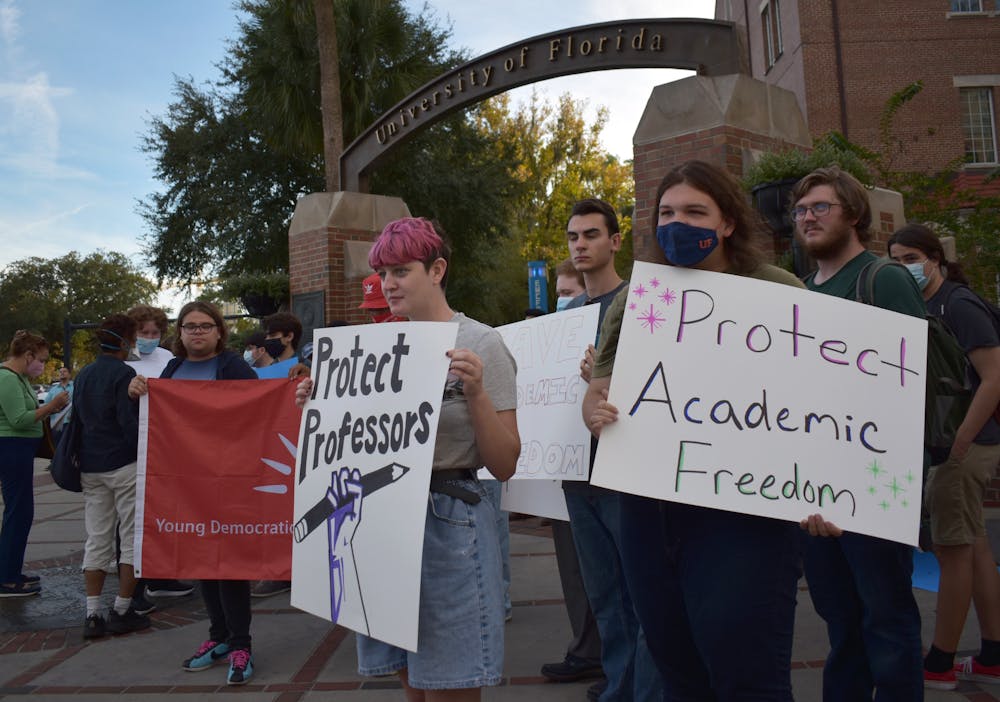Echoes of grievances from eight UF professors rang out across the Plaza of The Americas Wednesday morning.
Students and professors from the Free UF Coalition banded together to host a teach-in event to inform passerbys about the university’s academic freedom struggles.
Eight professors spoke out in November about their rights being barred by the university, raising questions about the institution’s independence from the state government.
Since then, students and faculty have been working to spark change around the campus. The United Faculty of Florida, UF Young Democratic Socialists of America, UF College Democrats and the United Campus Workers organized the coalition and the outdoor event.
Ten speakers stood at the center of Plaza to talk about the history of academic freedom at UF and ways to help protect professors’ academic integrity.
The event’s central location attracted students to take a pause from their day and listen to a few minutes of the speakers’ speeches. Coalition members also stood on the outskirts of the event passing out flyers ready to educate anyone willing to listen.
A professor’s speech booming over the portable sound system caught 21-year-old statistics junior Francesca Carbone’s attention. Carbone, who is on the College of Liberal Arts and Sciences student council, said academic freedom was a major discussion in the Fall.
Faculty members wanted to meet with CLAS student council to hear from students, many of whom were on the professors’ side; the faculty was happy to have their support and know they weren’t alone, she said.
“Professors are the ones teaching us,” she said. “I would like them to not be censored in what they believe they should be teaching. What’s the point of coming to a public university if they’re going to be censored about what they’re supposed to say?”
Three student musicians performed in between the speakers. Organizers wanted to include live music to draw people in and bring the three-hour event to life, said Allan Frasheri, president of the UF Young Democratic Socialists of America.
Frasheri and the vice president of YDSA recently went to the student government chambers to talk about the administration’s censorship of faculty. It was clear the majority of the senators had no idea what he was talking about, he said.
“When the people who are elected to represent you don’t even know what’s going on, that’s harming your interests,” he said.
Frasheri emphasized how this is just as important of an issue for students during his speech. He talked about how professors’ academic integrity affects them in the classroom.
Infringements on professors’ academic freedom harms students’ ability to take classes they want and harms students’ degrees by degrading the reputation of the university, he said.
Just as much as students need to take a stand, Frasheri believes the administration should protest pressure from the state legislature more.
“They should actively oppose foreign interference, like political influence, on our university, especially when it goes against the mission of the university,” he said.
The issue at hand, he said, is that the administration is self-regulating themselves to avoid conflict with the state.
“I would say morale is low,” Steven Kirn, a UFF and retired faculty member, said. “There is fear, and there is a sense that it’s smarter to put your head down.”
Anything that takes away from the pursuit of the truth and knowledge has a detrimental effect on students and learning, Kirn said.
Part of the learning process involves putting students outside of their comfort zone, he said, but legislation is preventing professors from teaching topics that might make someone uncomfortable.
“That stifles what university education is supposed to be about,” he said.
If professors are constantly worried about whether they can say, teach or research certain topics, it creates an unhealthy environment, he said.
This is not a new issue; it has historical precedence, and UF has a long history of academic integrity violations, he said.
Hopefully the event helped people to see the importance of academic freedom and why the community needs to take a stand, he said.
“It’s not like you snap your fingers and suddenly you got a revolution,” he said. “It’s more like you start a fire here, you start a fire here and just like wildfires sometimes they grow together, and then you got a movement. So, this is our little small fire.”
Contact Elena Barrera at ebarrera@alligator.org. Follow her on Twitter @elenabarreraaa.

Elena is a second-year journalism major with a minor in health sciences. She is currently the University Administration reporter for The Alligator. When she is not writing, Elena loves to work out, go to the beach and spend time with her friends and family.






